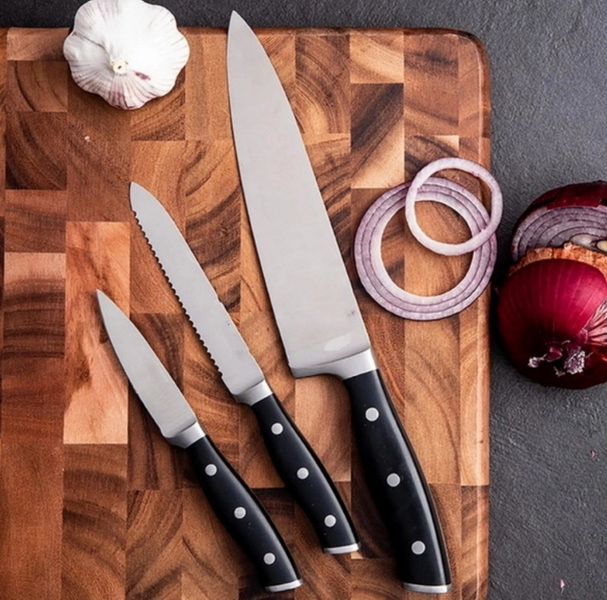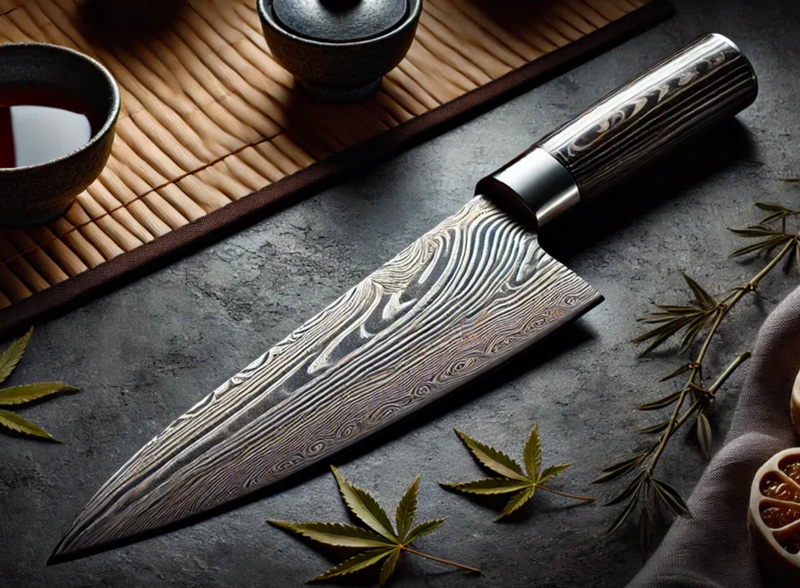- All
- Product Name
- Product Keyword
- Product Model
- Product Summary
- Product Description
- Multi Field Search
Views: 222 Author: Ann Publish Time: 2025-10-17 Origin: Site











Content Menu
● Advantages of Damascus Steel in Kitchen Knives
● Damascus Steel Kitchen Knife Manufacturing Process
>> Steel Selection and Billet Assembly
>> Heat Treatment and Tempering
● Customization Opportunities for OEM Clients
>> Blade Design and Steel Variations
>> Handle Materials and Ergonomics
● Care and Maintenance of Damascus Steel Knives
● Frequently Asked Questions (FAQ)
>> 2. Why choose Damascus knives over other kitchen knives?
>> 3. How should I care for a Damascus steel kitchen knife?
>> 4. Can OEM Damascus knives be fully customized?
>> 5. Are Damascus knives suitable for professional chefs?
Damascus steel has long been revered as one of the finest materials for crafting kitchen knives, gaining widespread acclaim for its blend of aesthetic beauty, strength, and performance. As a leading kitchen knife OEM factory in China, providing tailored services for foreign brand owners, wholesalers, and manufacturers, incorporating Damascus steel into kitchen products promises to add exceptional value to your offerings. This comprehensive article explores the numerous benefits of Damascus steel in kitchen knives, the detailed manufacturing process, care instructions, and customization options that make Damascus knives highly sought after by chefs and culinary enthusiasts worldwide.

Damascus steel is famed for its distinctive flowing water-like patterns created by layering and forging together different types of steel alloys. These layers not only form striking visual motifs but also enhance the blade's mechanical properties. Modern Damascus steel knives typically combine high-carbon steels with added elements like nickel or vanadium to balance toughness, flexibility, and corrosion resistance, making Damascus knives ideal for demanding kitchen tasks and long-lasting sharpness.
Exceptional Durability and Strength
The layered forging process bonds steel alloys with complementary properties, producing blades that resist chipping and breaking even under rigorous use. Damascus knives maintain edge integrity longer than most conventional steels, ensuring durability in heavy kitchen environments.
Thanks to the high-quality steels used in the layered construction, Damascus knives hold a razor-sharp edge much longer than typical stainless steel knives. This reduces the frequency of sharpening required, improving user convenience and consistent cutting performance.
Damascus knives are easily recognizable thanks to their mesmerizing surface patterns, which are further enhanced by acid etching during manufacturing. This distinct, artistic appearance not only raises the product's perceived value but also signifies superior craftsmanship, setting your kitchen knife OEM offerings apart in competitive markets.
Modern Damascus steel blends often include alloying elements that improve resistance to rust and staining—a major advantage in humid kitchen environments. Properly finished Damascus knives can withstand exposure to moisture, acids, and salts much better than traditional carbon steel blades.
The composite layering provides enhanced blade flexibility while retaining toughness, helping prevent blade breakage under strain. This flexibility supports precise, effortless cutting and reduces fatigue during extended culinary preparation.
Understanding the forging process of Damascus steel knives provides insight into their superior qualities. Our OEM factory applies a meticulous step-by-step procedure that ensures consistent quality and customizable options for foreign customers.
Choosing the correct steel alloys is fundamental. Common combinations include 1084 high-carbon steel paired with 15N20 nickel steel. Layers are cut into identical dimensions and stacked alternately to form billets—the starting blocks for Damascus steel.
The steel billet is heated in a forge up to 1500-2000°F until glowing red. Using flux materials like borax protects the metal surfaces while hammering them to bond the layers. The billet is folded repeatedly, increasing the number of steel layers to achieve the intricate pattern characteristic of Damascus steel. Each folding cycle demands skill and precision, strengthening the blade's homogeneity.

Following forge welding and folding, the blade is rough-shaped and refined through further hammering and grinding. Edges are sharpened carefully to the required angle, and surface decorations such as grooves or holes are added as requested by the OEM client.
The blade undergoes multiple thermal cycles—including heating, quenching in oil or water, cryogenic treatment using liquid nitrogen, and tempering—to relieve internal stresses, improve hardness, and attain optimum toughness. This stage ensures the blade performs excellently in cutting, retains sharpness, and resists brittleness.
To reveal the distinctive Damascus patterns, the blade surface is immersed in acid baths, which selectively etch the steel layers based on their chemical composition. This step enhances the contrast of the patterns while protecting the blade from corrosion. The final polish completes the striking appearance, combining form and function.
Our factory's OEM Damascus knives can be tailored extensively according to your brand's needs:
Specify blade length, thickness, steel grades, and layering patterns to appeal to different markets from professional chefs to home cooks.
Choose from wood, micarta, G10, or other materials with customized grips, finishes, and shapes tailored for comfort and style.
We offer laser etching or engraving services for unique Damascus patterns and brand logos to distinguish your products and reinforce brand identity.
Custom packaging options including gift boxes, knife rolls, or branded storage solutions are available, perfect for retail and promotional campaigns.
To maintain the beauty and performance of Damascus knives:
- Always hand wash with mild soap; avoid dishwasher use to prevent damage.
- Dry immediately after washing to inhibit rust and stains.
- Regularly hone to maintain edge sharpness and polish to preserve the pattern's brilliance.
- Store knives securely in blocks, magnetic strips, or protective sheaths to avoid blade damage.
Damascus knives combine ancient artistry with modern metallurgy, producing superior kitchen tools that last generations.
Damascus steel kitchen knives offer an exceptional blend of durability, sharpness, corrosion resistance, flexibility, and distinct visual appeal, making them highly desirable in the global kitchenware market. For OEM brand owners and wholesalers seeking to boost product value and exclusivity, Damascus knives represent a premium choice with customizable options to align with diverse consumer preferences. Our experienced Chinese factory is equipped for detailed craftsmanship and brand-specific enhancements, ensuring every Damascus knife we produce meets strict quality standards and market expectations.

Damascus steel is layered steel created by forging and folding different steel alloys to achieve enhanced strength, flexibility, and unique patterned aesthetics.
They offer superior edge retention, durability, corrosion resistance, and a visually distinct, artistic appearance.
Hand wash, dry immediately, hone often, and store properly to maintain performance and patterns.
Yes, blade design, steel type, pattern, handle material, engraving, and packaging can all be tailored to your brand's specifications.
Absolutely. Their durability and sharpness make them ideal for both professional and home kitchen use.
The Ultimate Professional Knives for Halal Butchery in Middle Eastern Kitchens
Chef Knife Size Guide: Choosing Between 6″, 8″, 10″, And 12″
Custom Knife Handles: How To Design A Chef Knife That Fits Your Hand Perfectly
Chef Knife Surface Treatments Guide: From Polished Migaki To Damascus Patterns
Inside Our Professional Knife Sample Room: Quality You Can See
Universal Knife Block Buying Guide: Modern Acrylic & ABS Knife Holders for Professional Kitchens
Universal Knife Block: The Complete Guide To Modern, Hygienic Knife Storage
The Complete Guide To Red Handle Knife Sets: Style Meets Functionality in The Kitchen
Professional Knives for Halal Butchery And Middle Eastern Cuisine